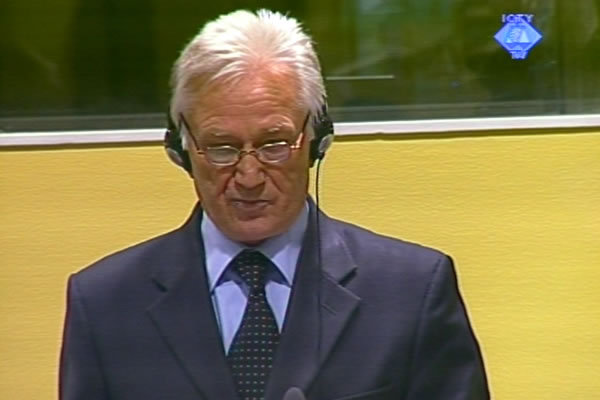Home
APPELLATE HEARING IN GENERAL PERISIC'S CASE
The defense and the prosecution responded to the judges' question whether the support in the form of personnel, logistics and funds Perisic had provided to the Serb armies in Bosnia and Croatia was ‘specifically directed' at aiding and abetting crimes or if it merely supported their war effort
 Momcilo Perisic in the courtroom
Momcilo Perisic in the courtroom Today, the defense and prosecution exchanged arguments on Momcilo Perisic's appeal against the judgment rendered in his case in September 2011. Perisic was found guilty of aiding and abetting the crimes in Sarajevo and Srebrenica and for failing to punish those who ordered the rocket attack on Zagreb by a majority decision and was sentenced to 27 years. A substantial part of the defense arguments is based on the separate opinion of presiding judge Moloto, who thought Perisic should be acquitted on all counts.
According to the defense, in order to prove this offense, it is necessary to prove 'the specific direction' and 'significant impact of the assistance’ to aiding, abetting or morally supporting the commission of the crimes. The majority in the Trial Chamber concluded that to establish liability, it is not necessary that given assistance was specifically directed at the commission of crimes. This opinion in turn implies that the US, French or British state and military officials could be found responsible for the crimes committed by foreign armies they supported in Sudan, Congo or Libya, the defense insisted.
The defense counsel argued that there 'is no evidence' that the aid Perisic had provided to the Serb armies in Bosnia and Croatia was directed at the commission of crimes. In the defense's view, the VRS 'had the right to fight' and it relied on the support of the FRY and its army to 'wage the war'. The assistance supported the war effort but was not in particular directed at the commission of the crimes that resulted from 'bad practice and poor command and control', the defense counsel said.
Defense counsel Stephane Bourgogne emphasized that Perisic wasn't authorized either de jure or de facto to issue orders or punish members of the VJ 40th Personnel Center, i.e., the SVK, who launched the attack on Zagreb in May 1995. Although defense counsel Novak Lukic, was 'convinced of Perisic’s innocence', he urged the judges to take into consideration mitigating circumstances and impose a milder sentence, if they decide to confirm the Trial Chamber's judgment.
In response to the defense's argument, the prosecution stressed that Perisic was not found guilty for the war effort, but because the assistance he had given to the VRS played a substantial role in the crimes committed in Sarajevo and Srebrenica. That army 'depended on the assistance’ that was 'crucial' for the crimes, prosecutor Goy argued. In response to Judge Meron's question, prosecutor Goy replied that Perisic, although he was not able to put a stop to Belgrade's assistance to the VRS, 'institutionalized' it despite the fact that he was 'aware of the intent to commit crimes'.
The prosecutor then commented on a provision in the Rome Statute of the International Criminal Court stating that a condition for aiding and abetting is that a person acts with intent to commit crime. According to the prosecution, the language of this provision reflects a compromise of the member states that couldn't agree if only knowledge that crimes are perpetrated was sufficient to establish responsibility or if the intent to perpetrate crimes was also required.
The prosecution referred to two Perisic's orders to the SVK personnel in late 1994 and in March 1995, claiming that the accused had effective control and was able to issue orders and punish the soldiers serving in that army. Finally, the prosecution urged the judges to confirm the sentence of 27 years in prison.
In the final part of the hearing, Perisic addressed the Appeals Chamber, asking the judges how his responsibility could be established beyond reasonable doubt if presiding judge Moloto raised doubts about his conviction. Perisic also said that the 'world didn't prohibit wars' and called on the Appeals Chamber to consider how the final judgment in his case would affect General Staff chiefs in other armies in countries currently supporting wars all over the globe. Also, Perisic said that he had 'defended my country from getting drawn into a war' and his actions 'were meant to prevent the spillover of the war into the FRY'.
The Appeals Chamber, consisting of judges Meron, Agius, Daqun, Ramaroson and Vaz, will deliver its appellate judgment 'in due time'.
Linked Reports
- Case : Perisic
- 2011-11-08 GENERAL PERISIC’S APPEAL
- 2011-09-06 PERISIC SENTENCED TO 27 YEARS FOR CRIMES IN BH AND CROATIA
- 2011-05-19 PRINTING MONEY TO SUPPORT WAR OPTIONS IN BOSNIA AND CROATIA
- 2013-02-15 FINAL JUDGMENT FOR PERISIC ON 28 FEBRUARY 2013
- 2013-02-28 APPEALS CHAMBER ACQUITS GENERAL PERISIC
- 2013-03-04 NO CONSISTENCY OR RIGOUR
